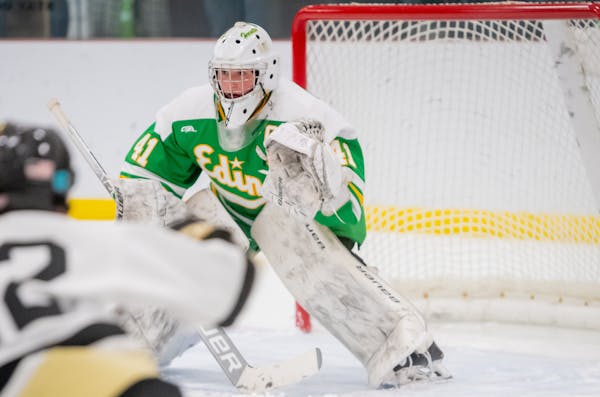Rumors circulated last summer about the fate of struggling metro area girls hockey programs, leaving players to joke among themselves about future alliances.
Aurelia Meza of St. Paul Academy and Lily Keefe of Burnsville, defenders on teams looking for co-operative partners to achieve required numbers, laughed it up during summer hockey sessions.
"We said, 'How hilarious would it be if our teams combined?'" Meza said. "Then she texted me when the news broke out and said, 'I guess we are playing together.'"
Graduation losses and fewer youth players caused Burnsville to host a six-team co-op this season, which includes at least one player from each of DeLaSalle, St. Agnes, St. Paul Academy, Faribault and Bethlehem Academy.
The new hockey conglomerate is called the Metro-South Phoenix. The schools are separated by about 140 miles round trip, and are as much as 53 miles apart. Players first skated together at tryouts. This season, they have used four different rinks for home games. And they started the season splitting practices before deciding to come together at the Burnsville Ice Center.
"I didn't expect to have a 25-0 record," said senior forward Madisyn Krumholz, who skated with Burnsville at the state tournament last season and leads the Phoenix with 18 goals. "But the girls have a strong connection. And our games haven't been one-sided at all. We're aggressive, and we keep going until the end of the game."
St. Paul Academy has long partnered with other programs to offer full varsity and JV rosters. Burnsville's need to do likewise perplexed hockey observers who watched the Blaze reach the Class 2A tournament in 2022 — their second appearance in three seasons.
"Everyone was shocked," Meza said of her school's choice to partner with Burnsville. "It seemed so random."
Co-operative programs happen in all sports and are staples of smaller communities around Minnesota. Now, some suburban metro area communities are joining forces.
Roseville and Mahtomedi are competing as one girls hockey program this winter for the first time. On the boys side, a pair of former state tournament championship programs, Apple Valley and Burnsville, were forced to pool shrinking numbers of available players.
"Both of us had a problem; both of us had a need," said Apple Valley/Burnsville coach Chris Sikich, a standout on Apple Valley's 1996 Class 2A boys hockey championship team. "It's weird, though, because we're rivals. When you think of those programs, you don't think of a need to co-op."
That need is showing up all over. The number of girls hockey teams has dropped from 123 in 2009-10 to 111 this season.
Times have changed. Demographic shifts hurt hockey because people of color traditionally haven't flocked to the sport. Families from myriad backgrounds can be turned off by the growing time and financial investment of youth hockey. In fact, combined youth programs are more popular by necessity.
While forming co-ops at the high school level offers immediate relief, the unintended consequences include future stagnation.
"There's no way individual programs can ever go back," said Claire Goldsmith, Girls Hockey Coaches Association president and first-year Minneapolis coach. "Because now, you really have no reason to fix the youth situation and grow the game. On the other hand, you're not helping kids stay active and out of trouble by denying opportunities."
Chris Lepper, who remained the head coach as Burnsville became the Phoenix, echoed Goldsmith's concerns, stating, "If you completely lose programs, kids transfer before they ever get to high school."
Four veteran Burnsville players transferred to Lakeville North amid the uncertainty about a solution. A final decision was reached Aug. 1, soon after high school teams' summer practice availability window closed. This season Lepper's mission started with the intangibles.
"You want these kids to feel good about this team and have a good time while we are working to become more competitive," Lepper said. "We have a lot of girls who were on the JV last year or a fourth-line varsity player now facing Class 2A competition in the South Suburban Conference. I worried they might burn out. But they are getting better."
The Phoenix (7-14) headed into Tuesday's game at Park of Cottage Grove hoping to stop a seven-game losing streak. After Tuesday, two games remain before the playoffs.
"Our girls know the situation," Lepper said. "They didn't grow up together, but they are hockey players. They want to win. And they believe we can if we peak at the right time."
![The Metro - South Phoenix girls hockey team huddled up between periods Tuesday, Jan. 24, 2023, at Drake Ice Arena in St. Paul, Minn. ] CARLOS GONZALEZ](https://arc.stimg.co/startribunemedia/3VUIAPINCEAIF77PBZGPXK7S74.jpg?fit=crop&crop=faces&w=550&&auto=format)







